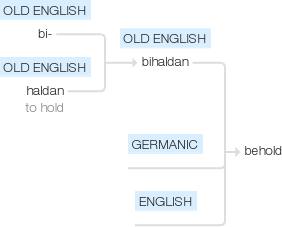Behold
Old English bihaldan, from bi- ‘thoroughly’ + haldan ‘to hold’. Parallel Germanic words have the sense ‘maintain, retain’; the notion of ‘looking’ is found only in English.
wiktionary
From Middle English beholden, from Old English behealdan(“to hold, have, occupy, possess, guard, preserve, contain, belong, keep, observe, consider, behold, look at, gaze on, see, signify, avail, effect, take care, beware, be cautious, restrain, act, behave”), from Proto-West Germanic *bihaldaną(“to hold with, keep”), equivalent to be- + hold. Cognate with Saterland Frisian behoolde(“to keep”), Dutch behouden(“to keep, restrain, preserve”), German behalten(“to keep, restrain, remember”), Danish and Norwegian beholde(“to keep”) and Swedish behålla(“to keep”).
etymonline
behold (v.)
Old English bihaldan (West Saxon behealdan) "give regard to, hold in view," also "keep hold of; belong to," from be- + haldan, healdan (see hold (v.)). Related: Beheld; beholding. A common West Germanic compound, compare Old Saxon bihaldan "hold, keep," Old Frisian bihalda "hold, possess, keep, protect, save," Old High German bihaltan, German behalten, but "[t]he application to watching, looking, is confined to English" [OED]. Related: Beholding.
